
by Kirsty Keep
Head Mistress, Lancing College Preparatory School at Hove
Schools and nurseries are increasingly taking learning outside, whether by using their own outdoor space as an open-air classroom or by tackling traditional ‘woodland activities’ in natural areas or ones specifically designed for the purpose. But where do the origins of Forest School lie and how do our schools and nurseries embrace that philosophy in 2020?
The longstanding Scandinavian passion for nature is known as friluftsliv which translates as ‘open-air living’. As far back as the mid-nineteenth century, Norwegian playwright Henrik Ibsen described friluftsliv as the value to spiritual and physical wellbeing achieved by spending time outside in remote locations. So-called ‘nature schools’ began to appear in Denmark as early as the 1950s and grew in number in the 1970s when the demand for childcare rose dramatically to meet the needs of mothers returning to work while their children were very young. These early schools developed a kindergarten system that provided children with the opportunities to learn and develop in natural environments and outdoor settings. They were modelled on the work of Friedrich Fröbel, a 19th century German pedagogue and a student of Pestalozzi. Fröbel recognised that each child has unique needs and capabilities and it is no surprise that this has laid the foundation for modern early years education offered today.
These days, for our youngest children, outdoor locations tend, generally speaking, not to be particularly remote but they offer experiences that are a world away from lessons within the walls of a classroom or learning through play indoors.
School trips and visits have always given children a taste of the world beyond school but outdoor learning at school is a way of using natural resources to learn about nature. It also offers some welcome respite from the plethora of electronic resources for recreation and learning that immerse today’s children, who are born ‘digital natives’ unlike their parents, grandparents and teachers who have had to acquire digital awareness or in some cases had digital awareness thrust upon them!
Many schools and nurseries have their own garden areas where children can literally get ‘hands-on’ experience, planting seeds, watering and weeding and seeing the fruits of their endeavours grow as the seasons change. Ponds and science gardens give a myriad of opportunities for children of all ages to try their hand at pond-dipping, recording the diversity of insects and bugs visiting the gardens and operating weather stations.
However, whatever fabulous facilities a school or nursery may have on site, the possibilities for taking learning outdoors at school are endless, only limited by imagination! They can range from outdoor maths, for example counting the right angles around the school buildings and campus, creating art from nature, using twigs and leaves to make temporary pieces of art that are not only cost-free but also recyclable. Young children studying history, for example, can see for themselves just how rapidly the Great Fire of London spread by creating their own model Tudor houses from cardboard boxes, packing them into a fire pit and watching them burn. Carefully supervised by staff armed with fire extinguishers, this activity can also act as a Health & Safety lesson as to what to do in the event of a fire!
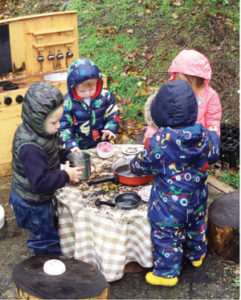 Forest School is a more sustained, long-term process which aims through positive outdoor experiences to encourage and inspire children to love the world around them. For preschool children, Forest School nurtures their sense of wonder and their curiosity about the world outside, closely entwined with the ideals of free-flow play and learning from play that underpin the child-centred learning ethos and areas that lie at the heart of the Early Years Foundation Stage which runs from birth to five years of age. Away from their school or nursery, they have adventures in natural habitats such as woods, rivers and streams, ponds and beaches. Supervised with the lightest of touches by staff, the children have the freedom to discover what fascinates them in nature and to respond spontaneously to the environment they are exploring.
Forest School is a more sustained, long-term process which aims through positive outdoor experiences to encourage and inspire children to love the world around them. For preschool children, Forest School nurtures their sense of wonder and their curiosity about the world outside, closely entwined with the ideals of free-flow play and learning from play that underpin the child-centred learning ethos and areas that lie at the heart of the Early Years Foundation Stage which runs from birth to five years of age. Away from their school or nursery, they have adventures in natural habitats such as woods, rivers and streams, ponds and beaches. Supervised with the lightest of touches by staff, the children have the freedom to discover what fascinates them in nature and to respond spontaneously to the environment they are exploring.
Forest School is for young children of all ages; it helps babies to expand their sensory awareness, for example by feeling plants and mosses in woodland or digging up shells and pebbles on a beach. Toddlers try their hands at making camps out of logs and branches and have their first go at climbing trees or making a tyre swing. Three year olds build on their problem-solving skills by arranging logs to form a bridge to get over a stream.
For older children, there is a huge range of practical activities including bushcraft, fire-lighting, knifecraft, such as whittling and carving, how to tie knots and build shelters. Naturalist skills such as identifying plants, animal tracks and signs are eagerly embraced and children enjoy learning how to forage safely and sustainably and how to prepare and cook wild food. Who would have thought under eights would get excited by the prospect of nettle tea?
Outdoor explorers learn soft skills too that nurture critical thinking skills and teamwork. They develop empathy and sympathy with their peers and learn how to work as a team to solve problems, honing their communication and negotiation skills. The children learn to recognise and assess risks for themselves and to make choices to ensure their group’s safety. They grow in confidence and self-esteem through these hands-on experiences.
It is also an excellent way to introduce conservation activities and the ‘leave no trace’ philosophy that we should preserve wild places and leave nature as unchanged by our presence as possible, so that future generations can enjoy it too. 
Above all, it’s fun – children can get messy, get wet, climb higher and develop a love of outdoor life. They explore the natural world around them using magnifying glasses, saws, spades and buckets. This brings their learning to life and helps to create an understanding of the balance of nature and resources.
The Lancing College family includes its two Prep Schools located in Hove and Worthing, and located on the edge of the College’s 550 acre estate, a Day Nursery which opened in September 2019 and offers day care all-year round for children aged two months and over. All three provide wonderful opportunities for children to take their learning outdoors and are prime examples of nursery school pioneer Margaret McMillan’s assertion made in the mid-1920s “The best classroom and the richest cupboard is roofed only by the sky!”

According to a study from children’s brand, Stokke, one in four (23%) parents say that their child complains ‘all of the time’ that they can’t spend enough time together. Overall, nearly two-thirds (60%) of children wish they could spend more time with their parents – with the main culprits being work, chores and lack of money to do things.
The most popular quality time activities that parents said their children enjoyed doing the most as a family were:
1. Eating out (41%)
2. Going to the park (41%)
3. Going for walks (40%)
4. Going to the movies (37%)
5. Visiting family and friends (31%)
6. Playing board games (30%)
7. Reading (27%)
8. Swimming (27%)
9. Cooking (26%)
10. Playing games consoles (25%)
Stine Brogaard from Stokke’s offers five top tips on becoming closer to your child and ensuring you spend quality time together.
1.Don’t take time for granted
Instead of booking playdates for your child when you have the day off, make it quality mother/daughter or father/son time, doing something together that you both want to do.
2. Ask your child questions
Find out what their favourite things to do are. A child’s taste changes so much over time so it’s important to keep on track and do things that reflect this.
3. Share passions
Find something that you are passionate about and encourage your child to get into it too. Even better if it’s something you can do together, whether that’s reading, walking, or playing a sport such as football or tennis. This will make it much easier to find time for each other that you’ll enjoy. Though read the signs if they don’t enjoy it, you can’t force these things!
4. Cook together
Eating is something we do every day, so cooking together is a fantastic way to have fun together, give your child responsibility and educate them about food. Give them set tasks, let them choose what they’d like to cook and encourage them. Seeing the family appreciate the food you’ve created together will be something very special to them and give them confidence.
5. Make the most of the shorter windows of time
We all have very busy lives, always going from A to B whether that’s school, work, extra-curricular classes or friends’ houses. If you’re travelling together, make sure you pay your child your full attention and make an effort to understand what’s gone on in their day and share snapshots of your own. The most important thing is to laugh together, and find ways to have fun, wherever you are – no matter how little time you have.
Research has revealed, 87% of parents wished they could spend more time with their children while parents say that less than half (45%) of the time they spend with their child is quality time.
Research of 2,000 parents of children aged under 14 also revealed that when it comes to making key decisions in the household, it appears that the child has more control over what happens today than years gone by. Nearly three-quarters (72%) of people said their child had more control in their home than when they were young, and one in four (27%) admit that their child completely rules the roost! In fact, over half (53%) of British parents said that their child is the bossiest person in the household.
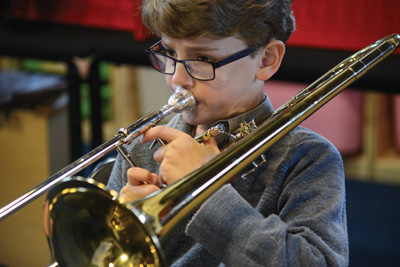
Talent spotting in schools
The difference between scholarships and bursaries
More attention than ever before is being devoted to the significant levels of financial support provided by independent schools, to assist aspirational families on lower incomes. According to the Independent Schools Council’s 2019 census, 34% of pupils educated at independent schools currently receive help with their fees, at a cost of £1bn. The majority of this is provided directly from the schools themselves.
Fee assistance comes in many different shapes and sizes and, as a result, the world of scholarships and bursaries can seem like a minefield to those embarking on the journey for the first time. What can make things even trickier, is that different schools give different names to their individual types of fee assistance. One school might offer a ‘scholarship’ worth 10%, whereas at its neighbour down the road, it might be 50%. It is therefore important to know how to navigate the world of scholarships and bursaries and to establish the difference between them.
At the majority of schools, scholarships will refer to a portion of money off school fees and they will be awarded on merit – the result of a child being an excellent academic all-rounder or brilliant at, for example, art, drama, music, sport, or design technology. They usually (although not always) come with some form of percentage discount on the cost of a child’s overall fees.
Bursaries, on the other hand, are usually hosted by charitable foundations within independent schools and tend to be means-tested places that are offered to an outstanding pupil from a family on a very low income who would never be able to consider providing their child with a private education without the support of a bursary. In most cases, this level of assistance gives life-changing access to talented students who would otherwise never benefit from an independent school education and all that it offers. Being independent, these schools have been able to keep the torch alight for vital areas of the wider curriculum – such as music, the arts, competitive team sports, modern and classical languages – that have so often had to be marginalised in their state counterparts.
The landscape has changed significantly in recent years and it is now more usual for scholarships and awards to attract a very modest reduction in school fees, with larger fee remissions being offered through means-tested bursaries. In the very early stages it is important to establish the detail of the criteria for entry, the maximum scholarship or bursary that a school is prepared to award, and the process that you and your child will need to go through to secure either a scholarship or bursary.
A typical scholarship process could look like this:
• Initial enquiry received by School Registrar who discusses scholarship criteria, any specific examination requirements, for example.
• Families interested in pursuing an application are sent appropriate forms for completion.
• Parents submit completed forms, with child’s most recent school report and reference from current school.
• Application considered and, if successful, child invited for interview.
• Child puts together a portfolio demonstrating their abilities and wider interest in the area for which they are applying for a scholarship.
• Child visits the school with portfolio, is interviewed by the Head, attends interview with the Head of Department and demonstrates their talents, undergoes academic tests, as appropriate.
• Once all applicants are interviewed, candidates are considered by the Head and Heads of Department.
• Scholarships offered according to merit and number available.
While the process for securing a bursary might look like this:
• Initial enquiry received by the School’s Registrar, who discusses the application process and criteria applied.
• Families interested in pursuing their application are sent an ‘Application and Means-Testing Financial’ form for completion.
• The family completes and returns the form with the child’s most recent school report.
• The child’s potential is assessed ‘on paper’ by the Head.
• The family’s financial circumstances are then assessed by the School’s Bursar or an independent financial assessment company.
• If successful, the child’s parents or guardians are interviewed by the Head.
• If successful, the child attends an ‘experience day’ at the school, is interviewed by the Head, is academically assessed and is given the opportunity to demonstrate their particular talents to relevant Heads of Department (maybe art, drama, DT, music or sport).
• If successful, the family might be visited at home.
• If successful, the Head might put forward short-listed candidates with recommendations for consideration by, and confirmation from, Charity Board.
• Foundation Scholarship places offered, as appropriate.
Probably the most important thing for any parent or guardian interested in applying for a scholarship or bursary for their child or charge to remember, is that they should not worry about approaching their school of choice and openly discussing the opportunities available. There is no such thing as ‘saying the wrong thing’ and it may well be that their child is exactly the kind of student that a school is looking for. The important thing to realise is that the schools are as keen to support talented children with bursaries and scholarships – provided
they match their criteria – as parents or guardians are to secure them.
Christian Heinrich is Headmaster at Cumnor House Sussex in Danehill. He set up The Cumnor Foundation which offers 2 means-tested bursaries each year that cover the entire cost of a talented child’s education for ten years from the age of 8 to 18, in collaboration with sixteen independent senior school partners. www.cumnor.co.uk/cumnor-community/the-cumnor-foundation/
For further information please contact Cecilia Desmond, Registrar at Cumnor House Sussex on 01825 792006 or email registrar@cumnor.co.uk. www.cumnor.co.uk
by Eleanor Costello
Brighton Dome and Brighton Festival
Young people face new challenges every day. From navigating the complexities of an ever-changing Internet culture to fighting for their future in an era of climate crisis. Art provides opportunities for everyone to make sense of the world, to test our boundaries and let our imagination thrive. Children benefit from having the opportunity to read books, go to theatre shows and to make their own art.
The acclaimed poet and Brighton Festival 2020 Guest Director, Lemn Sissay said; “Art saves lives, it literally saves lives. Art is how we translate the human spirit. That’s why you have art and religions. That’s why people sing. That’s why we read poems at funerals and weddings, we need some bridge between the spiritual, the physical, the past, the present, the future.”
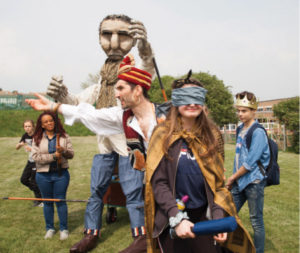 Through events like Brighton Festival, young people can explore, discover and participate in the arts. For 30 years the Children’s Parade has officially marked the start of Brighton Festival, with over 5,000 participants, including 3,473 school children, stepping into show stopping costumes they have designed and made themselves. Around 10,000 people come along to see the parade and be part of the largest annual children’s event in the UK. The parade is a unique event produced by community arts organisation, Same Sky, which offers thousands of young people the chance to come together in creations they’ve designed around a central theme, giving them a sense of belonging. In 2020, the Children’s Parade theme is Nature’s Marvels, offering a platform for participants to think more about the world and environment around them.
Through events like Brighton Festival, young people can explore, discover and participate in the arts. For 30 years the Children’s Parade has officially marked the start of Brighton Festival, with over 5,000 participants, including 3,473 school children, stepping into show stopping costumes they have designed and made themselves. Around 10,000 people come along to see the parade and be part of the largest annual children’s event in the UK. The parade is a unique event produced by community arts organisation, Same Sky, which offers thousands of young people the chance to come together in creations they’ve designed around a central theme, giving them a sense of belonging. In 2020, the Children’s Parade theme is Nature’s Marvels, offering a platform for participants to think more about the world and environment around them.
Stories fire the imagination, invite us to empathise with and understand others, give children the creativity needed to face the world and even the tools to change it. Young City Reads is an annual Brighton Festival and Collected Works CIC reading project. A book is selected for primary school children in Brighton & Hove, Sussex and beyond to read and discuss, culminating in a final event with the book’s author at the Festival in May. In 2019, over 3,000 pupils took part in free weekly activities. For 2020, the chosen book is Malamander by Thomas Taylor, featuring a daring duo Herbert Lemon and Violet Parma who team up to solve the mystery of a legendary sea-monster. This is a chance for schools across the county to foster a love of reading in young people and give support to teaching staff to think outside the box with their curriculum.
Hilary Cooke, Brighton Festival Children’s Literature Producer says; “Children’s book events are an opportunity to turn the private activity of reading into a shared experience. Being in a room with a new (or favourite) author and a group of young readers is quite magical, with laughter, imagination and surprise. Illustrators drawing live on stage create another layer of creativity that is beautiful to watch (and possibly my favourite thing).” Due East, Hangleton and Knoll Project and the community steering committees enable local residents to make their vision come to life in Our Place, a Brighton Festival event that has been running for three years. Pop up performances take place across Hangleton and East Brighton with a community event in each area. Seeing arts and culture being celebrated and given a platform in their own neighbourhood opens the door for young people to think differently about the places they live in.
Brighton Festival offers opportunities for young people in Brighton and beyond to experience groundbreaking, original and spectacular performances by international artists. Australian company, Gravity & Other Myths bring a new jaw-dropping circus show bound to blow the minds of aspiring acrobats, Drag Queen Story Time gives children the opportunity to be who they want to be with a LGBTQ friendly storytelling, and hilarious theatre show Slime allows two to five year olds to squish and squelch their way through a tale about a slug and caterpillar.
May is a time of spectacular celebration across the county, with Brighton Fringe, The Great Escape, Artist Open Studios and Charleston Festival in addition to Brighton Festival’s jam-packed programme.
Supporting the next generation of art-goers is integral to Brighton Festival’s spirit and this year’s programme aims to bring a variety of events for children and young people – from infants to Instagrammers. Children of all ages can discover, create and participate in the arts, giving them unexpected and enriching experiences that can be shared with their friends or family. Many events are free, others starting as low as £5 and there are often family offers so the whole clan can come along.
Head to www.brightonfestival.org today to find out what’s happening at Brighton Festival from 2nd to 24th May 2020.
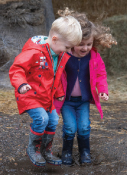 If it’s not possible to escape the colder months here in the UK and jet off to sunnier climes this year, then we might all just need to be a bit more creative in order to make sure we can still enjoy the great outdoors.
If it’s not possible to escape the colder months here in the UK and jet off to sunnier climes this year, then we might all just need to be a bit more creative in order to make sure we can still enjoy the great outdoors.
Summer staycations have been pretty popular this year, and no doubt some people were probably found moaning about it being too hot, but soon enough we will be longing for warm weather and sunshine again.
“There’s no need to wait for a warm, or even dry day to plan a family trip out” says Nicola Henderson, who is a mother of three and runs family farm, Godstone Farm, in Surrey.
Here are her top tips for day trips to help get you outdoors whatever the weather:
Book online
With reduced capacities to ensure social distancing most venues will ask you to book in advance, and why risk not getting in with excited children in the back seat? Many attractions may offer their best price if you book in advance via their website and often more savings can be made the further ahead you book. That all important booking confirmation is also a valuable chance for the attraction you are visiting to communicate important information to you; in uncertain times its best to get the low-down before you arrive.
Use the website for all important information
Most venues will now have information on their site about their ‘Covid Secure’ measures and any information you need to know. But, let’s not forget the fun stuff – the website will give you all the details of what’s open and what’s on, plus check out the blog and any latest posts on social media. This day out might be a special treat, so show the children pictures and read content to them, even play a quiz in the car about what they think they might see and do. You might not be going on holiday, but you can still escape for a bit!
Arrive early
Let’s face it, the children aren’t likely to give you a lie in on your staycation so make the most of the day. Arriving early means getting the car parking space closer to the entrance (important in bad weather!) and also being first in line for things that might get busier during the day. Whether it’s the front of the queue for a ride, or the first to cuddle a cute bunny it’s always good to beat the crowds, especially on weekends and holidays. Check out opening times before you visit – some attractions have started opening earlier than usual – this seems a popular idea, especially when toddlers get tired and need an afternoon snooze.
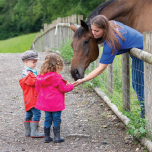 Leave the picnic at home
Leave the picnic at home
There are two main reasons for this. Firstly, hear the cries of parents up and down the land who are plain bored of making a picnic. All those lockdown walks where daily exercise meant packing up a hamper, going to the green space close by and trying to entertain the children while keeping in line with government guidance. Nicola adds “Certainly with my family, when lots of places were still closed there was an endless snack-packing exercise to go out to the local park.” Secondly, if you are able to support your local business, or small attraction in the area by making a purchase when you are there, then do. Of course, picnics are still fine if that’s what you prefer.
We love wellies!
It’s a fact! Remember that blistering heatwave? Yep, there were still those children that want to wear wellies, and hey, you’re only a child once so why not. If it is raining however, why not make extra fun on your day and do a bit of puddle jumping? If the children are dressed for it, then it makes bad weather into a real positive and provides endless fun. There’s puddle jumping competitions wherever you go in the rain, because you just make them yourself, or even try the puddle jumping Olympics! The only rule is that parents must join in too.
Wherever you go, whether it’s a staycation away from home or day trips out nothing beats the outdoors and the benefits we all know it can bring.
Godstone Farm will continue to provide fun whatever the weather, but it’s always worth checking the website for up to date opening days and times. They have some exciting plans for 2021 including a Day Nursery and Pre-School planned to open in early 2021. www.godstonefarm.co.uk
by Stephen McCullough
Regency Ballet School for Boys
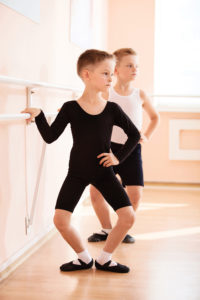
For decades girls have far out-numbered boys in dance while classical ballet, in particular, has long been considered a pursuit for girls and has therefore typically been seen as ‘feminine’. This is, of course, far from the truth because male dancers have always been an important part of any professional ballet company. Overcoming the stereotype that ‘boys don’t dance’ is a real hurdle however, there has recently been considerable progress in challenging this concept.
The ‘Billy Elliot effect’ has had a massive positive effect on boys, inspiring many to pursue the study of ballet in greater numbers than ever before while dancers such as Carlos Acosta and Sergei Polunin, along with increased media attention focused on male stars performing on ‘Britain’s Got Talent’ and ‘Strictly Come Dancing’, have given dance even greater recognition. With this exposure more boys are realising that dancing can actually be ‘pretty cool’. However, there are many others who would love to dance but still don’t have the confidence to try.
So why should a boy choose to study ballet, especially when there are so many other ‘masculine’ sporting activities available to them? Generally speaking, ballet dancers are a lot stronger and more flexible than other sports athletes. As a highly physical artistic sport classical ballet not only nurtures physical conditioning that promotes muscular strength and agility but also improves flexibility and range of motion which encourages good posture and in turn helps in preventing injuries. The physical demands of classical ballet is particularly beneficial for boys who are
very active as it allows them to focus excess energy productively through learning and performing.
Requiring a discipline of the mind, classical ballet also provides a mental workout, enhancing cognitive skills and concentration. Due to the intense mental processing required during class both hemispheres of the brain are engaged which helps to increase neural connectivity. Because several brain functions are integrated at once this multi-tasking activity improves and sharpens co-ordinated learning.
Whatever their age, studying ballet is beneficial for all boys and over time the combination of physical and mental skills can cross-over into other aspects of life. The physical intensity required during class helps to improve physical performance in other sports while increased cognitive function, concentration, discipline and perseverance often helps during school and throughout life. Alongside the knowledge and skills required to perform, ballet also helps dancers to develop an understanding of movement as a means of artistic communication, which in turn teaches them to show emotions through their body language.
Choosing to be a dancer may be an unusual career choice but is a brave decision for any boy as it requires energy, focus, perseverance and above all, a passion and a drive to succeed. With encouragement, hopefully a new generation of boys will ‘get into ballet’, because we need more male dancers. The lack of male dance teachers, however, often means many boys participating in a ballet programme are rarely taught by one. It is good for boys to work with a variety of teachers during their training, and although not essential it is certainly an advantage for boys to have a male dance teacher not only in terms of technique but as a strong, positive role model to emulate and inspire them.
Ballet may look very graceful and easy on stage, but the amount of skill required to perform is huge and at times can be mentally demanding. However, with a supportive network of family and friends a boy is far more likely to succeed. We want boys to enjoy dancing, surrounded by other like-minded males who have the same interest in dance and even if a boy isn’t destined for a career in dance studying ballet is not only fun but an enjoyable, challenging activity that offers a superb all round education that teaches many useful life skills.
Regency Ballet School for Boys offers classical ballet classes for boys aged 8 -16 and follows the BBO dance syllabus. The school has opened as a response from parents looking for an opportunity for their boys to dance in an environment where they don’t feel like the odd ones out.
www.regencyballetschool.com

by Polly Warren
Centre Manager at First Class Learning – Brighton
Could tutoring be the answer?
With children facing tougher exams and tests such as the new style GCSEs and the more challenging SATS tests for seven and 11 years olds, the tutoring industry is continuing to boom for children across the board, with a quarter of all school children receiving some form of tuition in 2018.
However, concerned parents are hiring tutors for their children not only for exam preparation, but for a whole number of reasons from helping give their children’s self-confidence a boost to giving them an extra challenge in their strongest areas. Some use tutors to help catch up with school work after absence, others to help their children grasp key concepts in maths or English if they’ve been struggling.
Whatever the reasons, tutoring has been shown to improve school performance, confidence and self-esteem, as well as help children develop independent study skills and learn at their own pace.
Maths is the most popular subject for tuition (77%), followed by English (55%) and then science (30%).
How to choose the right tuition for your child
In the past, choosing a tutor was largely based on personal recommendation, but nowadays the industry is far more professional and there are many different tutoring services to choose from.
One-to-one tutoring at home
These lessons usually take place in the student’s or tutor’s home and involve just the pupil and tutor. One-to-one attention may be required if a child is really struggling in a subject or if they have a complicated learning style, but this traditional option is by far the most expensive. One-to-one tutors charge on average between £25 and £40 per hour, working out between £100 and £160 per month.
One-to-one and small group tutoring at a study centre
During these sessions, an expert tutor will be responsible for no more than six children at a time. The tutor not only works with each child on their own individualised learning programme by providing expert support and guidance, but they also encourage independent learning.
When children study alongside other children in this sort of small, focused group, the pressure of sole one-on-one attention is taken off individual children, whilst allowing for one-to-one help from the tutor when needed.
This type of tutoring is typically cheaper than private one-to-one tutoring but can still be highly effective. Many children prefer it as it is not as intense as one-to-one home tuition and helps keep learning fun. Study centres charge between £60-£70 a month.
Parents of Evie, who attended Brighton’s First Class Learning’ study centre say:“We were really impressed with how much the support helped Evie. She has a much more positive attitude to learning and we can see a huge improvement in her confidence, ability and approach to her
maths work.”
Online tutoring
Online tuition is tutoring that takes place over the Internet using a communications programme such as Skype or Google+. Private online tutors are often more affordable (£20-£30 per hour) as they will not be required to travel and may choose to tutor more than one student at once, but many parents feel uneasy that tutors will not be in direct contact with the student.
It really makes a difference!
Extra tuition really can make a huge difference, and it’s more affordable and accessible than ever. Once a child starts understanding the material, the frustration, anxiety and apprehension they felt about schoolwork will disappear, and they will carry this new found confidence with them back to the classroom, allowing them to blossom and genuinely start to enjoy learning again.
Polly Warren is a teacher with many
years of experience across a range of educational settings, and Centre Manager of First Class Learning’s (FCL)
study centre in Brighton.
Please contact Polly on 01273 730873
www.firstclasslearning.co.uk/
brighton-withdean
brighton@firstclasslearning.co.uk

by Tamara Pearson
Senior Teacher (Curriculum), Our Lady of Sion Junior School
One cannot foresee the pressure you put on yourself as a parent when the midwife first hands your newborn to you. Which nappies are best? Will this car seat save my child’s life? What does my pram say about us as parents? These soon turn to comparisons over when children learn to crawl, walk and talk. Once at school age, we cannot help but wonder “where is my child in the class?”, “are they happy?”, “does the school of our choice match the needs of our child(ren)?”
We all want the best for our children. So what do we go for? The ‘hothouse’ or the ‘greenhouse’? Are our children just ‘surviving’ or truly ‘thriving’?
To even begin to answer these questions, we must consider what the true purpose of education and the role of schools is. What are our children learning and why? How are they learning? How is failure perceived? How are children assessed and how is that communicated? Is learning/attainment ‘fixed’ or is there genuine room for growth and development of the mind?
Research shows that childhood anxiety is the highest it has ever been. Circumstances, finances, relationships, expectations, social media, diet and exercise all play their part. What are schools doing to address these challenges? Fostering an authentic mindset in students is crucial; the jobs they will have in the future may not yet exist today.
Much has been made of Growth Mindset in the world of work and education, but, in reality, this is not enough. In order to prepare children for life’s challenges, they need a full toolbox of skills. Having a proactive/positive approach needs to be underpinned by social, emotional, and academic tools in order to fully educate the whole child. It is not about just working hard, it is about working smart.
As professional educators, it is our responsibility to prepare children in moving beyond being passive consumers of information and toward becoming active innovators. We must actively inspire and provide genuine opportunities to develop children’s passions.
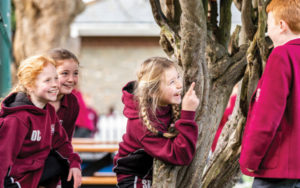 At our school, our children are driven by our ethos ‘Consideration Always’. As role models to the school community and beyond, we entrust them to develop and demonstrate the best version of themselves. Children develop when they are given the opportunity to do so. Mary Myatt’s philosophy of ‘high challenge, low threat’ leadsthe way.
At our school, our children are driven by our ethos ‘Consideration Always’. As role models to the school community and beyond, we entrust them to develop and demonstrate the best version of themselves. Children develop when they are given the opportunity to do so. Mary Myatt’s philosophy of ‘high challenge, low threat’ leadsthe way.
Expecting consistent productivity and positivity is not realistic, attainable, or even desirable; we may flit between fixed and growth mindsets. This is okay. The clincher is to remember that whatever setbacks we face, we can reflect/process our thoughts, then jump back in the saddle and continue the ride to our intended destination.
Equipped with a well-developed toolkit of social, emotional, and academic skills, every child can take on inevitable setbacks (and pressures of success) with integrity, resolve and good humour.
Tamara Pearson is a member of the Senior Leadership Team at Our Lady of Sion Junior School in Worthing.
She is also mother to a six year old who attends Sion and is passionate about helping the Juniors embrace every enrichment opportunity available.
She is a UK Parliament Teacher Ambassador and in the last three years has seen Sion Juniors rewrite its Curriculum, assessment approach, create an Intergenerational Project, achieve Beach School status, Eco Schools Silver Award and make meaningful links with the community.
www.sionschool.org.uk
by Claire Russell
founder of PlayHOORAY!
Have you ever thought about how you can better encourage your child to play more effectively? Now, we don’t all live in an ideal world, our homes have to work for many different things, as well as look nice, but there are a few simple tricks we can apply to create a more playful home.
• Turn off the TV and keep distractions to a minimum when your child is playing.
• Keep resources to hand and ensure your child knows where they are, helping them to become independent and not rely on you to find the answers.
• Teach your child how to do an activity first. Don’t assume they know how to take on the role of a shopkeeper despite the numerous times they’ve been to the supermarket with you!
• Go with the flow. If you set up an activity for your little one, but they do something totally different to what you’d intended, that is absolutely fine. Support them and encourage them to follow
their own initiative!
• If they have enjoyed playing with a particular activity try leaving it out for them to access when they want for at least a week. If you don’t like the mess, perhaps you can throw a tea towel over it?
• Praise your child for their play, the way they play and what they are doing, reassuring your child and showing them how much you value their play. After all, it is supporting their development!
• Try not to interrupt your child when they are focusing, if it can wait then let it. Young children can only concentrate for small amounts of time, so you’ll probably only be waiting for a few minutes anyway!
But what exactly should you be doing when your child is playing?
In reality, there are some days when you want your little one to play to occupy themselves so that you can take a breather because, let’s face it, it’s exhausting being a parent and its important to prioritise looking after yourself! And there are those days when you have a list as long as your arm and you just need five minutes to get jobs done or make dinner. And that’s fine too, honestly it is. We all do it! But then there are days when you do have time, you do have a flicker of energy and you have the headspace to support your child as they play – great! When that occurs, there are many things you can do that will support their development:
• Sit by your child, giving them a sense of security, reassuring them that you’re in sight while showing them that you value their play.
• If they invite you to play with them, copy them. Don’t take charge, just do what they do and let them take the lead.They will love it!
• When you feel you can, talk about what you are doing. You might feel a bit silly doing it but you are teaching your child how to play. Use words they may recognise but introduce new vocabulary too. Tell them what you like, dislike, your favourites and give reasons. Your child may offer their opinion or they may not. There’s no pressure!
• As your child plays, as long as you don’t think it will break their concentration, comment on what they’re doing. Suggest a few things you like about their playing, for example: “I like the way you are stacking the bricks to make a tall tower. I like the way you are trying to get that to stick. I can see you are persevering.”
These show your child that you value what they are doing. Your child may choose to tell you about their play and may begin running their own commentary.
These are just a few ideas you can implement to encourage play. You don’t have to do them all, try a few and see if it makes a difference.
Happy playing!
Mum to one and Early Years Specialist, Claire Russell is founder of playHOORAY! and the designer of playPROMPTS activity cards designed to equip parents with realistic, fuss-free play ideas. For further information please visit www.playhooray.co.uk











